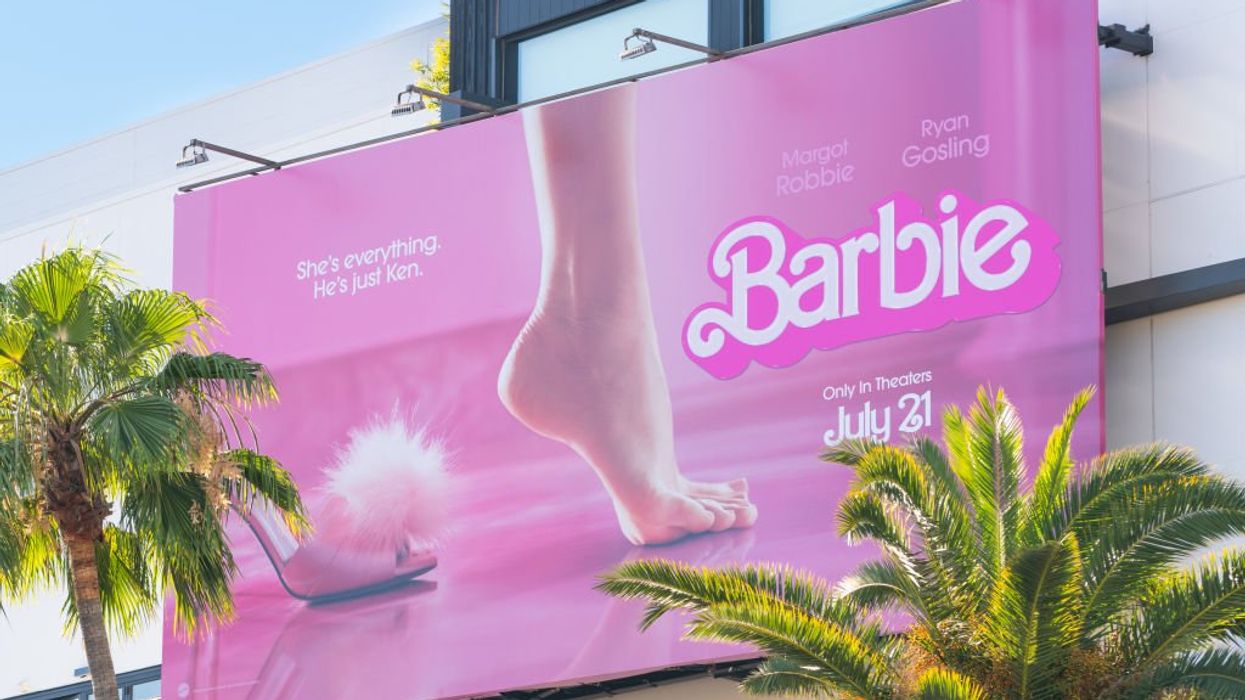
AaronP/Bauer-Griffin/GC Images/Getty Images

This article is part of an ongoing series in which Blaze Media writers react to the "Barbie" movie. For other installments, see here, here, here, and here.
Ben Shapiro hated Greta Gerwig’s smash hit "Barbie" movie so much that he burned a Barbie and a Ken doll on his YouTube channel. He wasn’t serious about this, of course. He had them speak in silly voices and exploded their pink dune buggy with deliberately cheap-looking CGI. He was … well, you might say he was being playful. Ben Shapiro plays with Barbies.
Boys always have. They’ve set Barbies on fire; they’ve hung them, decapitated them, and dismembered them. At their hands Barbies have endured freezing, boiling, defenestration, microwaving, and dog mauling. But the self-conscious, toxic male bravado of these assaults can’t hide their true nature. Being “mean” to an assemblage of molded plastic is still playing with it.
No other toy invites such violence. Maybe boys do it to cope with the realization that they too play with dolls. As the first adult-shaped doll, Barbie also birthed the “action figure,” a term coined by Mattel rival Hasbro to sell its new “Barbie for boys,” G.I. Joe. But girls abuse their Barbies with equal gusto, melting hair, erasing facial features with nail polish remover, and scraping off breasts to form ersatz Kens. Where the feminine genius for cruelty really shines, however, is in the creation of lurid psychodramas pitting Barbie against Barbie. Murder, infidelity, gaslighting and/or imprisonment, out-of-wedlock pregnancy, conspiracy, orgies: the girl who’s everything has seen it all.
When Barbie hit stores in 1959, she was an instant hit with girls bored with playing at motherhood. Gerwig dramatizes this with an homage to "2001": a giant Margot Robbie looms over a group of awestruck little girls who proceed to smash their old baby dolls in a frenzy. But then what? Soldiers and superheroes come with implicit instructions; they have origin stories and missions. Barbie just looms on the horizon, an attractive yet forbidding idol of femininity. Maybe that’s why so much Barbie play takes the form of desecration.
Barbie is “an emblem, a scapegoat, a lightning rod, a target and, most of all, a mirror,” writes archetypal Gen Xer and Bitch magazine founder Andi Zeisler in the New York Times. Zeisler loved Barbie as a kid; it was only as a third-wave feminist in her 20s that she began to see something sinister in that freakish waist-to-hip ratio. As a 40-something mom, Zeisler participated in Barbie’s rehabilitation, popping up in a 2018 documentary about Mattel’s attempts to create a more inclusive and empowering brand.
Margot Robbie’s Barbie takes Zeisler’s journey in reverse. We first meet her in Barbie Land, a gynocratic utopia where women cheer each other on while holding all the cool, important jobs. Her feminist awakening comes when she enters the real world, where she encounters catcalling and confronts the disgruntled sisterhood she’s betrayed with her “unrealistic body expectations.” She ends the movie in a strange state of innocence, neither role model nor tool of the Patriarchy but simply looking forward to the future, excited to be a girl.
The way "Barbie" traces an ideological progression without ever picking a side makes it an inviting “take” generator. Instead of fan service, it offers pundit service. Depending on which culture warrior you consult, the movie is either surprisingly based or predictably woke. Either way it’s not very much fun. The same blankness that makes Barbie an irresistible toy also makes her a boring protagonist. It’s not that Gerwig doesn’t enjoy herself: the sets are delightful (and accurately scaled), and Ryan Gosling convincingly expresses the yearning of the world’s biggest simp, especially in the big, nicely choreographed musical number “Just Ken.” Even the unconventional casting of actor Hari Nef pays off; his restrained, sensitive portrayal of one of the other Barbies is a subtle, satisfying nod to the long tradition of men in drag playing female characters.
But the movie as a whole inspires admiration rather than emotion. It’s like one of those mint-condition “collectible” Barbies that never gets taken out of the box. The characters in "Toy Story" are as generic and mass-produced as any Barbie doll; it’s their fraught devotion to a specific child that makes them real to us. Gerwig’s Barbie, on the other hand, never breaks out of her plastic shell. Unlike Woody and Buzz and the gang, she has no deep desire to be played with. That somewhere out there a child cherishes her is something she takes for granted; it’s only when the constant stream of love dries up that she bothers to seek out “her” kid. And when that kid rejects Barbie for being a sexist psyop that ruined her childhood, it’s nothing personal – what matters to Barbie is how people in general feel about her. Her “hero’s journey” amounts to nothing more than an encounter with a focus group. "Barbie’s" only lived-in character is Kate McKinnon’s Weird Barbie, whose outré appearance and goofy physicality (she does a lot of splits) suggest a rich shared history with some charmingly intense playroom genius. Unfortunately, she mostly handles exposition, serving a story that never stops being a story about a brand.
Of course, hiding crass commercialism in plain sight with self-deprecating irony is job one for the modern comedy blockbuster. Will Ferrell’s strained, mannered Mattel CEO is clearly inspired by his far better turn as "The Lego Movie’s" villain, an adult enthusiast defending the “right” way to play from the anarchy of unrestrained childhood imagination. But the "Barbie" Ferrell is only nominally the bad guy. There’s no climactic showdown, and he exits the movie with a shrug. His only goal is to ensure a bright future for the intellectual property he controls; this happens to be "Barbie’s" ultimate purpose as well. Talk about synergy.